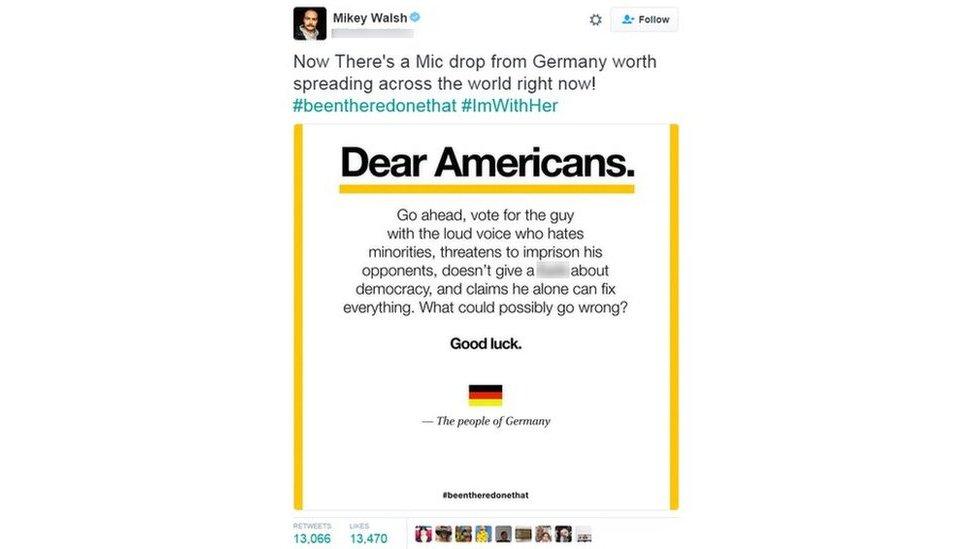German Citizen Sparks Controversy with Comparison of Trump to Hitler
A tweet from a man identifying himself as Johan Franklin has ignited a spirited debate over the implications of the current U.S. presidential campaign, drawing parallels between Donald Trump’s rhetoric and that of Adolf Hitler in the 1930s. Franklin, a German national residing in San Diego, California, expressed his concerns through a provocative message addressed to Americans, with a signature line suggesting “the people of Germany” might have valuable insights on the dangers of supporting a candidate who “threatens to imprison his opponents.”
The Viral Message
Franklin’s tweet quickly gained traction, fueled by the hashtag #beentheredonethat, as it resonated with a segment of the public wary of Trump’s aggressive campaigning style. The mention of Hitler in this context led to a flurry of social media memes linking the two figures, igniting discussions that ranged from agreement to vehement criticism. Some detractors took issue with the comparison, branding it for its inflammatory nature.
Defending the Comparison
In an interview with the BBC, Franklin elaborated on his reasoning, acknowledging that likening Trump to Hitler was a strong assertion. “It didn’t have much to do with Trump himself,” he explained, “but rather the manner in which he has mobilized support despite numerous warning signs.” Franklin expressed his growing anxiety as he conversed with Trump supporters, realizing the historical parallels that echoed the sentiments his grandparents once shared about the rise of Nazism in Germany.
Although Franklin praised the dialogue that followed his post, he recognized that his views do not represent the entirety of the German population. “The signature was more of an exaggerated emphasis,” he noted, insisting that while Trump’s behavior shares similarities with historical events, “you cannot compare Trump (or anyone) to the monster that was Hitler.” His point stressed the dangers of fervent nationalism and unchecked authority, warning against overlooking troubling signs.
Reactions and Backlash
The tweet received a mixed response. While many found resonance with Franklin’s sentiments, others dismissed it as a recurring trope in political discourse. Comments ranged from skepticism about Franklin positioning himself as a spokesperson for Germans to outright declarations of disdain toward his views. One supporter of Clinton tweeted, “Remember this as we head to the polls tomorrow,” while others echoed concerns regarding current issues in Germany related to the migrant crisis.
Among the supporters of Franklin’s message were both Americans and Germans, including a user from Berlin who echoed his thoughts with, “Couldn’t have said it better myself.” This mix of affirmations and critiques illustrates the polarized sentiment surrounding Trump’s candidacy.
Franklin’s Motivation
As an IT consultant shuttling between Hamburg and California, Franklin’s intent was to shed light on what he perceives as a deteriorating climate of civility in the U.S. election as well as the negative narratives proliferating on social media. “If there was a ‘kill that person instantly’ button on Twitter, I’m sure people would use it,” he expressed, reflecting on the extreme reactions fostered by such platforms.
| Topic | Details |
|---|---|
| Origin of Tweet | Posted by Johan Franklin, a German citizen living in the U.S. |
| Key Message | Warnings about potential dangers of Trump’s leadership style. |
| Public Reaction | Varied responses, ranging from agreement to strong criticism. |
| Franklin’s Intent | To provoke discussion on civility and historical awareness. |
Despite facing backlash, including death threats, Franklin is satisfied that his message has spurred discussion among those who share similar concerns but may feel compelled to remain silent. As a father of young children, he reflects on the historical narratives shared by his grandparents, who grappled with feelings of guilt and helplessness during the rise of the Nazi regime, asserting, “We all grew up with stories like: ‘We didn’t know! We really didn’t! Ok we had a hunch but by then it was too late’.”

